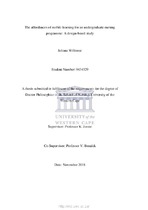| dc.description.abstract | The global use of mobile devices, and their connectivity capacity, integrated with the affordances of social media networks, provides a resource-rich platform for innovative student-directed learning experiences. Technology has become embedded in the daily lives of students, who become more approachable when technology is used within the higher education context. In 2014 the Educause Centre for Analysis and Research partnered with 213 higher education institutions across the United States of America. It was established that 86 percent of undergraduate information technology students owned a smartphone and half of that percentage owned a tablet. A systematic review on mobile learning in higher education focusing on the African Perspective in 2017 concluded that there was an increase in the use of mobile learning in higher education.
Higher education institutions continue to move away from traditional, lecture-based lessons towards new, innovative teaching and learning methodologies to facilitate emerging pedagogies and strategies, thereby enhancing student learning. The adoption of technological innovation could promote the unfolding of a social process that over time could enhance social connectedness among young students and their older adult educators.
Mobile learning is fundamentally defined as “learning with mobile devices” and it has the potential to extend the philosophies of learning through innovation It was identified that research in the field of m-learning can be divided into four areas, namely: pedagogy; administrative issues and technological challenges; ensuring sustainable development in education using m-learning; and the impact of new applications.
With the increased need for nursing professionals, promoting the quality and effectiveness of nursing education has become crucial. It is thus important to establish learning environments in which personalised guidance and feedback to students regarding their practical skills and the application of their theoretical knowledge within clinical learning environments is provided. | en_US |

